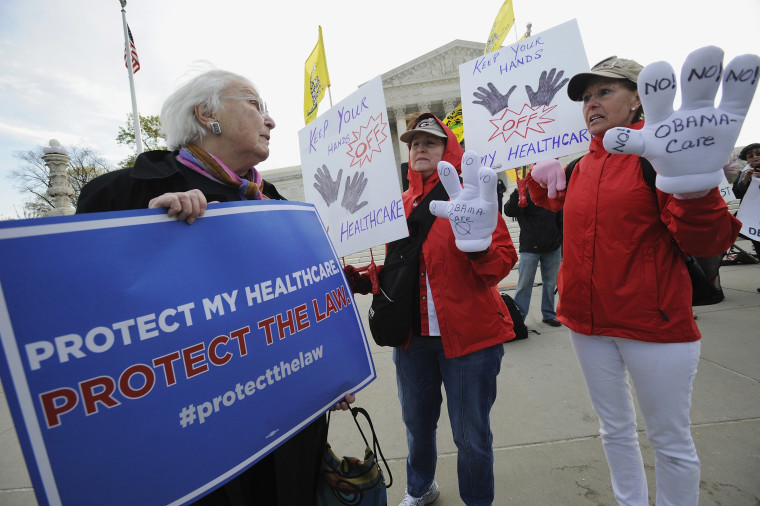In the political debate surrounding the King v. Burwell case at the Supreme Court, there are effectively two competing factions: those who acknowledge that the litigation is hopelessly insane, and those who know the case is hopelessly insane but pretend otherwise for the sake of appearances.
Once in a while, even a congressional Republican is willing to stand in support of reality.
At issue in the case is whether half of a sentence, buried within the law and removed from context, should be used to tear down the American health care system and strip millions of families of their health security. The
New York Times set out to determine how that half of a sentence wound up in the law, and reporter Robert Pear talked to "more than two dozen Democrats and Republicans involved in writing the law." Not one of them endorsed the argument put forward by the plaintiffs.
"I don't ever recall any distinction between federal and state exchanges in terms of the availability of subsidies," said Olympia J. Snowe, a former Republican senator from Maine who helped write the Finance Committee version of the bill. "It was never part of our conversations at any point," said Ms. Snowe, who voted against the final version of the Senate bill. "Why would we have wanted to deny people subsidies? It was not their fault if their state did not set up an exchange."
Right. As Charles Gaba has
noted, this is precisely how every member of the House, every member of the Senate, every congressional staffer, every White House staffer, everyone at HHS, everyone at the IRS, everyone at Treasury, everyone at the Justice Department, everyone at the Congressional Budget Office, every journalist covering the debate, every governor, every state legislator, every insurance company, and every hospital interpreted the law.
Though Snowe is too polite to say so explicitly, she's effectively acknowledged that the case her party is pushing to take coverage from millions of families is based entirely on a lie.
It's not just Snowe, either.
The idea of denying subsidies to people who bought insurance through the federal exchange "was never discussed," said Charles M. Clapton, a lawyer who worked on both committees for Senator Michael B. Enzi, Republican of Wyoming. Mr. Clapton said he had difficulty accepting the argument advanced by the plaintiffs because it was "so contrary to the intent" of those who had written the legislation.
Jon Chait, who today described the case as "almost literally insane,"
added, "It is difficult to convey to people who don't follow health care for a living just how preposterous the lawsuit against Obamacare has become."
It really is challenging. We're accustomed to a certain degree of nonsense driving so much of our contemporary debates, and I imagine for some observers, there may be an assumption that the "real" truth lies somewhere between what the left and right are arguing.
I simply lack the words to fully convey how wrong this assumption is in a case like this. Even proponents of the King case itself must realize that they're pushing a con that's so brazen, it's genuinely insulting to anyone with the slightest grasp of reality.
I'm 42 and I've followed politics closely for as long as I can remember. I've never seen anything quite as idiotic as this.
Brian Beutler
added today that nearly all current congressional Republicans are "caught in the grip of the right's collective amnesia and fantasia. The spectacle of it is breathtaking to sentient observers of the health reform process, but ultimately meaningless if the Supreme Court does the right thing in June, and rules for the government. If it doesn't, the textual argument will effectively be over. But, for the purposes of reading such a bad decision into its proper context, addressing the ensuing chaos, and clarifying for the record for the public, the historical argument will take on even greater significance -- which makes Snowe's contribution extremely valuable."
